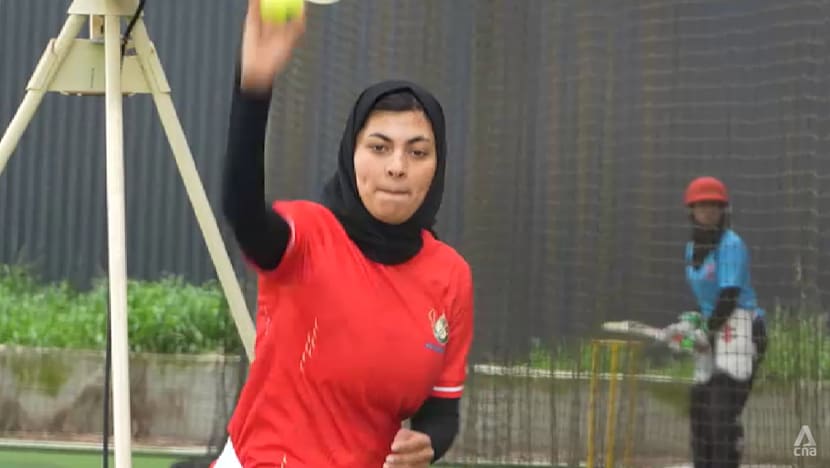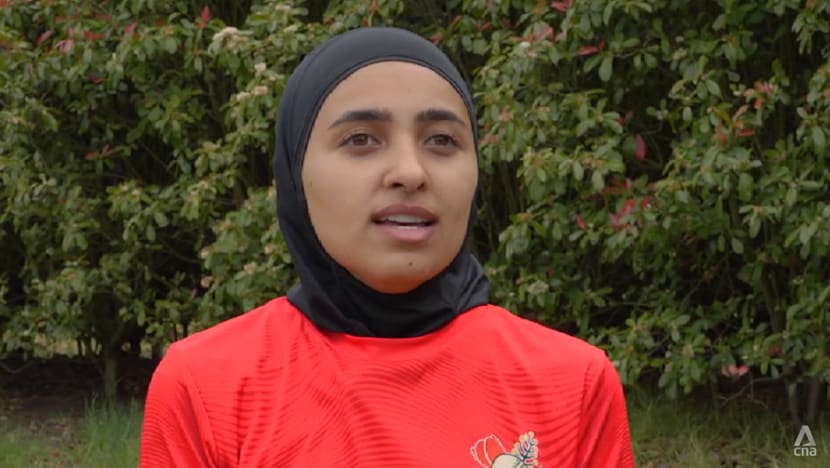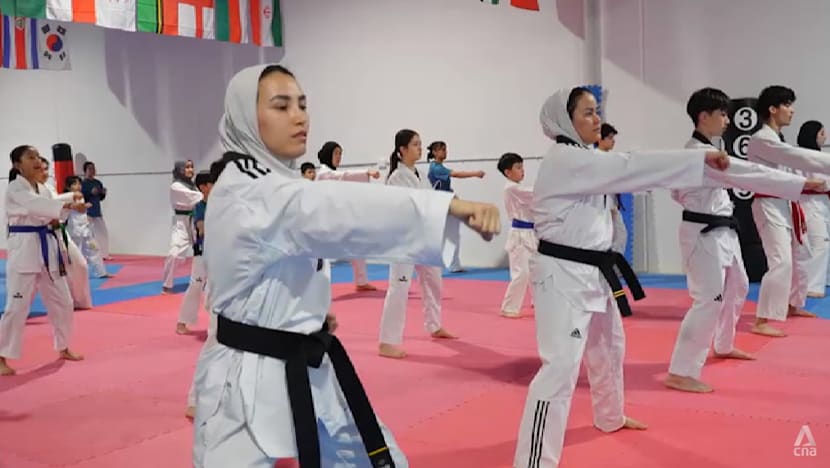Afghan women athletes rebuild their sporting careers in Australia after fleeing Taliban rule
They escaped Afghanistan with little more than their dreams. Now, these athletes are training again and fighting for a future where they can compete freely.

Former Afghanistan national cricket player Firooza Amiri training in Melbourne.

This audio is generated by an AI tool.
MELBOURNE: When the Taliban seized control of Afghanistan again four years ago, women and girls were swiftly barred from playing sports.
For many of the country’s top female athletes, the only way to stay alive – and keep their sporting dreams alive – was to flee.
Among them was 21-year-old cricketer Firooza Amiri, who escaped to Australia with nothing but an Afghanistan team shirt she could not bring herself to destroy.
‘SPORT ALWAYS GAVE ME A VOICE’
For Firooza, cricket is more than just a game – it is a passion that has shaped her life.
The sport is also what made her a target once the Taliban seized power in 2021, when the United States withdrew troops after nearly two decades of war. It prompted a mass exodus as thousands tried to flee the country.
Firooza, who played for Afghanistan’s national team, spent weeks in hiding as the new regime hunted down female athletes.
“They were checking the houses. First thing I did, I burnt everything. All my cricket gear, my medals,” she told CNA.
“The only thing I couldn’t burn was my Afghanistan T-shirt. That means so much to me. For me, that T-shirt is something that every time I looked at it, (I thought:) I cannot give up on cricket.”
She was one of 19 Afghan women cricketers who received emergency humanitarian visas to Australia.
Today, she has made good on her promise not to give up on her sport – honing her batting skills with Dandenong Cricket Club in Melbourne.
“It’s not only about playing cricket and escaping reality. Sport always gave me a voice, and I use that voice to always say that we belong on the field,” she said.
Firooza’s determination is contagious, said the club’s assistant coach Veronica McLeod.
“She comes every week to every training, every game with an amazing positive attitude. It actually empowers the rest of the girls,” she added.

Firooza trains alongside her older sister and former national teammate, Nazifa Hamdani.
“We always share together, everything. The way she wants to be a professional cricketer. The way she is fighting for women back in Afghanistan, that always makes me proud,” Nazifa said.
A TALE OF TWO CITIES
The Afghan women’s cricket team has been split since arriving in Australia, with some settling in Melbourne and others in Canberra.
Despite living 650km apart, the squad reunited for the first time this year after a training camp in India during the ICC Women’s Cricket World Cup. The camp was funded by the International Cricket Council (ICC).
The athletes say their dream is to be allowed to compete as a team once again.
Afghanistan’s Taliban government refuses to recognise any women’s sports teams. As a result, the ICC does not officially recognise the Afghan women’s squad.
However, the council continues to fund the men’s team. This is despite Afghanistan’s ban on women in sport violating the ICC’s own membership rules.
“What about us? We just want the ICC to support us, to help us to come to a stage where we can represent our country and have the same opportunity as men,” Firooza said.

The ICC did not respond to CNA’s request for comment.
Australia is one of several countries refusing to play a bilateral cricket series with Afghanistan in support of the women’s team.
Professor Jacqui True from the Centre of Excellence for the Elimination of Violence Against Women (CEVAW), an Australia-based research centre that promotes women’s safety and empowerment, said the sporting world cannot look away.
“International sporting bodies and governments who host international sporting tournaments have a responsibility to not legitimise the Taliban,” she added.
FIGHTING BACK THROUGH SPORT
Researchers tracking the situation in Afghanistan say hundreds of women there have vanished – and their relatives often punished – for defying Taliban orders restricting women’s freedoms.
They said sports can offer a powerful platform for change.
“Afghan women are not always victims – they’re also changemakers, as we see with our athletes,” said CEVAW research fellow Farkhondeh Akbari.
“They don’t say: ‘We play’. They say: ‘We fight’. They’re challenging the Taliban’s narrative about women’s bodies.”
After four years spent rebuilding their lives in Australia, Firooza and her sister said they will continue fighting for their sport and for other females back home.
“I feel we are like a voice for girls … we receive too many messages from girls (that) they want to be cricketers, they want to join this team and this gives us more hope to (be) fighting more for this team,” said Nazifa.
TAEKWONDO ATHLETES FINDING NEW GROUND
Cricket is not the only sport where Afghan women are rebuilding their futures.
In Melbourne, taekwondo athletes Taieba Akbari and Khadija Rezaiee are training again after losing their chance to represent Afghanistan internationally.

The pair, who earned their black belts together in Herat, western Afghanistan, said their martial arts journey has always been a form of resistance.
“With all of the challenges in Afghanistan we did 13 years (of) our lives in taekwondo. We fight against injustice to girls. We need to represent ourselves, our gender and our family,” said Taieba.
For Khadija, the sport is part of her identity. “It’s not like just taekwondo. It’s life. It’s love for me. I cannot live without taekwondo.”

The World Taekwondo Centre in Melbourne has taken them in, with head coach Ali Rahimi guiding their development.
But chasing their sporting dreams comes at a cost – being away from loved ones is the most difficult part.
“When I evacuated Afghanistan … I was happy that I got away from that bad situation. But I was sad too because I left my country, left my family,” said Khadija, who makes it a point to call her family daily.
The athletes say they have also become each other’s family by navigating the challenges of life in exile together, including learning English and adapting to a different culture.
“I’m safe now. My life is safe now … At the beginning it was very hard. But after four years living in Australia, it’s getting easier,” said Taieba.
Their ambitions are evolving too. Taieba hopes to represent Australia’s poomsae team, while Khadija has her sights set on training the next generation.
“My message for women out there is: You are strong. You should believe in yourself. Sport is not just for men. It’s for everyone,” said Khadija.






















